- Clone
- 315-2C11 (See other available formats)
- Regulatory Status
- RUO
- Other Names
- Prominin-1, AC133
- Isotype
- Rat IgG2a, λ
- Ave. Rating
- Submit a Review
- Product Citations
- publications
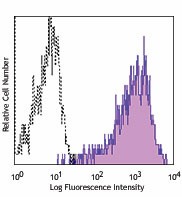
-

Mouse CD133 transfected cells were stained with CD133 (clone 315-2C11) APC (filled histogram) or rat IgG2a, κ APC isotype control (open histogram). -

C57BL/6 mouse bone marrow cells were stained with FITC-conjugated Ly-6G, CD3 and B220, CD117 PE, and CD133 (clone 315-2C11) APC (middle) or rat IgG2a, κ APC (bottom) isotype control. Data was gated on Ly-6G/CD3/B220 negative cell population. -

| Cat # | Size | Price | Quantity Check Availability | Save | ||
|---|---|---|---|---|---|---|
| 141207 | 25 µg | 142 CHF | ||||
| 141208 | 100 µg | 362 CHF | ||||
CD133 (also known as prominin-1 and AC133) is a 120 kD pentaspan glycoprotein with 5 transmembrane domains which localize to cellular protrusions. CD133 was initially described as a surface antigen specific for human hematopoietic stem cells and as a marker for murine neuroepithelial cells and some embryonic epithelia. Later on, CD133 was found on other stem cells, including endothelial progenitor cells, glioblastomas, neuronal, and glial stem cells. In addition to hematopoietic stem cells, CD133 was found on cancer cells, such as some leukemia cells and brain tumor cells. It also has been detected at low levels in the kidney, pancreas, placenta, and fetal liver tissue. Although the biological function of CD133 is not completely understood, CD133 has been extensively used as a stem cell marker for normal and cancerous tissues.
Product DetailsProduct Details
- Verified Reactivity
- Mouse
- Antibody Type
- Monoclonal
- Host Species
- Rat
- Immunogen
- CD133-expressing-GFP-RBL2H3 plus CFA as adjuvant.
- Formulation
- Phosphate-buffered solution, pH 7.2, containing 0.09% sodium azide.
- Preparation
- The antibody was purified by affinity chromatography and conjugated with APC under optimal conditions.
- Concentration
- 0.2 mg/ml
- Storage & Handling
- The antibody solution should be stored undiluted between 2°C and 8°C, and protected from prolonged exposure to light. Do not freeze.
- Application
-
FC - Quality tested
- Recommended Usage
-
Each lot of this antibody is quality control tested by immunofluorescent staining with flow cytometric analysis. For flow cytometric staining, the suggested use of this reagent is ≤0.25 µg per million cells in 100 µl volume. It is recommended that the reagent be titrated for optimal performance for each application.
- Excitation Laser
-
Red Laser (633 nm)
-
Application References
(PubMed link indicates BioLegend citation) -
- Zhang Y, et al. 2012. Diabetes. 61:2114. PubMed
- Product Citations
-
- RRID
-
AB_10898121 (BioLegend Cat. No. 141207)
AB_10896756 (BioLegend Cat. No. 141208)
Antigen Details
- Structure
- 120 kD pentaspan transmembrane glycoprotein
- Distribution
- Hematopoietic stem cells, epithelial progenitor cells, leukemia cells, brain tumor cells, kidney, pancreas, placenta, and fetal liver cells
- Function
- Biological function unknown
- Cell Type
- Epithelial cells, Hematopoietic stem and progenitors, Leukemia, Neural Stem Cells
- Biology Area
- Cell Biology, Immunology, Neuroscience, Neuroscience Cell Markers, Stem Cells
- Molecular Family
- CD Molecules
- Antigen References
-
1. Singh SK, et al. 2004. Nature 18:396.
2. Falini B, et al. 2005. New Engl. J. Med. 352:254.
3. Bonanno G, et al. 2004. Transfusion 44:1087.
4. Gaipa G, et al. 2002. Haematologica 87:347.
5. Wuchter C, et al. 2001. Haematologica 86:154. - Gene ID
- 19126 View all products for this Gene ID
- UniProt
- View information about CD133 on UniProt.org
Related FAQs
Other Formats
View All CD133 Reagents Request Custom Conjugation| Description | Clone | Applications |
|---|---|---|
| APC anti-mouse CD133 | 315-2C11 | FC |
| Purified anti-mouse CD133 | 315-2C11 | FC |
| PE anti-mouse CD133 | 315-2C11 | FC |
| Biotin anti-mouse CD133 | 315-2C11 | FC |
| PE/Cyanine7 anti-mouse CD133 | 315-2C11 | FC |
| PE/Dazzle™ 594 anti-mouse CD133 | 315-2C11 | FC |
| Brilliant Violet 421™ anti-mouse CD133 | 315-2C11 | FC |
| Alexa Fluor® 647 anti-mouse CD133 | 315-2C11 | FC |
| TotalSeq™-A1037 anti-mouse CD133 | 315-2C11 | PG |
| TotalSeq™-B1037 anti-mouse CD133 | 315-2C11 | PG |
| TotalSeq™-C1037 anti-mouse CD133 Antibody | 315-2C11 | PG |
Customers Also Purchased
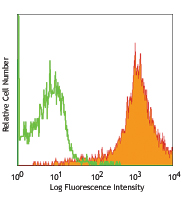
Compare Data Across All Formats
This data display is provided for general comparisons between formats.
Your actual data may vary due to variations in samples, target cells, instruments and their settings, staining conditions, and other factors.
If you need assistance with selecting the best format contact our expert technical support team.
-
APC anti-mouse CD133
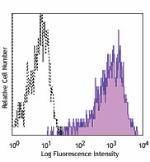
Mouse CD133 transfected cells were stained with CD133 (clone... 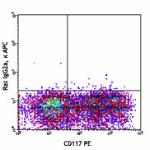
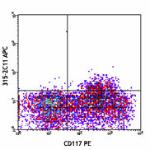
C57BL/6 mouse bone marrow cells were stained with FITC-conju... -
Purified anti-mouse CD133
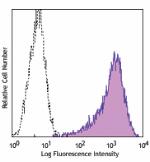
Mouse CD133 transfected RBL-2H3 cells were stained with CD13... 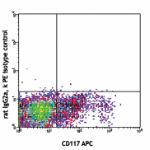
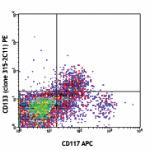
C57BL/6 mouse bone marrow cells were stained with CD117 APC ... -
PE anti-mouse CD133

Mouse CD133 transfected RBL-2H3 cells were stained with CD13... 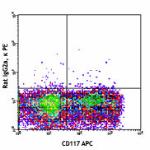
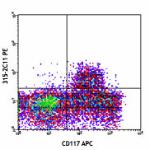
C57BL/6 mouse bone marrow cells were stained with FITC-conju... -
Biotin anti-mouse CD133
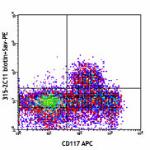
C57BL/6 mouse bone marrow cells were stained with FITC-conju... 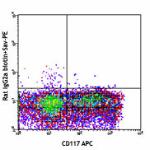
-
PE/Cyanine7 anti-mouse CD133
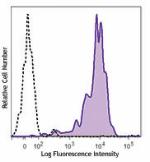
Mouse CD133 transfected RBL-2H3 cells were stained with CD13... 
C57BL/6 mouse bone marrow cells were stained with CD117 APC ... -
PE/Dazzle™ 594 anti-mouse CD133
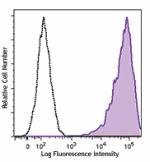
Mouse CD133 transfected cells were stained with CD133 (clone... 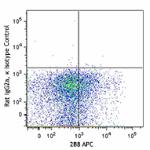
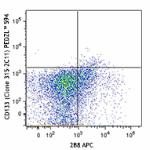
C57BL/6 mouse bone marrow cells were stained with CD117 APC ... -
Brilliant Violet 421™ anti-mouse CD133
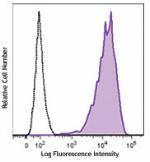
Mouse CD133 transfected cells were stained with CD133 (clone... 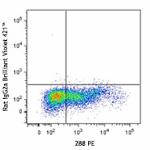
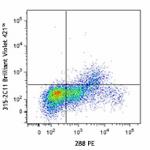
C57BL/6 mouse bone marrow cells were stained with CD117 PE a... -
Alexa Fluor® 647 anti-mouse CD133
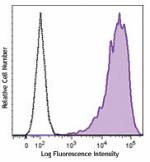
Mouse CD133 transfected cells were stained with CD133 (clone... 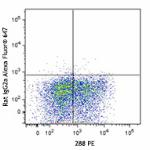
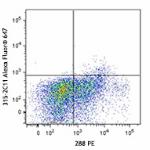
-
TotalSeq™-A1037 anti-mouse CD133
-
TotalSeq™-B1037 anti-mouse CD133
-
TotalSeq™-C1037 anti-mouse CD133 Antibody
 Login / Register
Login / Register 










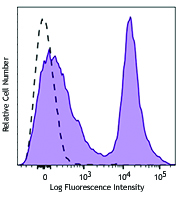
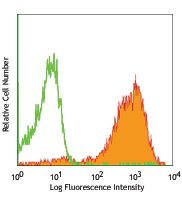
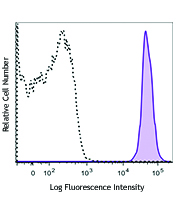



Follow Us